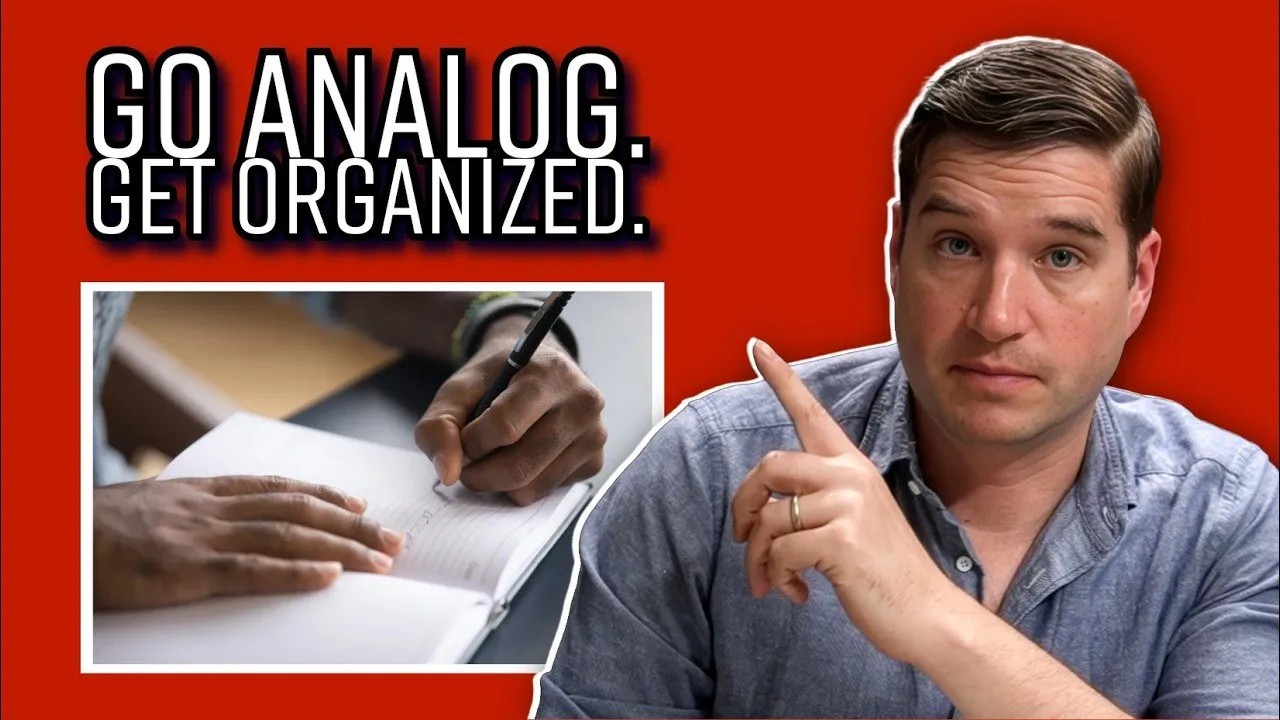Table of Contents
Two world-class performers share profound insights on writing, learning, and peak performance through decades of mastery in their respective fields.
Key Takeaways
- Perfectionism is the voice of the oppressor that keeps you paralyzed your entire life
- All first drafts of great books began as completely unreadable initial attempts
- Quality as a way of life manifests in small daily habits that compound over time
- Internal locus of control beats external validation for sustained creative performance
- Systematic meditation practice creates the stillness necessary for breakthrough insights
- Thematic interconnectedness allows learning principles from one field to transfer to others
- Embracing your unique funk leads to unobstructed self-expression through your art
- Scarcity principles force focus on what's most essential rather than diluting quality
Overcoming Creative Perfectionism
Perfectionism represents the primary obstacle preventing most people from creating meaningful work. Anne Lamott, bestselling author of twenty books including "Bird by Bird," identifies perfectionism as fundamentally oppressive rather than motivational.
- The perfectionist voice creates impossible standards that guarantee failure before you begin any creative project
- Every admired author's masterpiece originated from completely unreadable first drafts that seemed hopeless initially
- The "shitty first drafts" approach removes pressure by accepting terrible initial attempts as necessary stepping stones
- Writing becomes manageable when approached "bird by bird" - focusing only on the immediate paragraph rather than the entire project
- "Just take it bird by bird buddy," her father advised, breaking overwhelming tasks into digestible daily actions
- Internal criticism functions like "K-FKD radio" broadcasting constant negative commentary that drowns out creative intuition
- The solution involves turning down the left speaker (criticism) while amplifying the right speaker (supportive voices)
Recovery from perfectionism requires recognizing it as a survival mechanism that once served a purpose but now creates unnecessary suffering. Lamott's husband developed techniques for reassigning the inner critic to productive roles rather than trying to eliminate it entirely.
Developing Radical Self-Care Practices
Sustained creative performance demands putting yourself first rather than constantly serving others' needs. This counterintuitive approach actually enhances your capacity to contribute meaningfully to the world.
- Growing up as the family mediator created patterns of taking emotional leftovers while giving others the best parts
- The "broken egg yolk" syndrome represents accepting less than you deserve because it seems noble or necessary
- Dark nights of the soul occur when you exhaust all previous strategies and must find entirely new approaches
- Three-day alcohol blackouts led to the realization that old coping mechanisms had stopped working completely
- "Grace is spiritual WD-40" that provides just enough support to prevent complete collapse during difficult transitions
- Radical self-care means structuring days around your own needs first, then finding time for others' requirements
- Setting firm boundaries with family members protects both your creative energy and their long-term wellbeing
The transformation from people-pleasing to self-prioritization creates space for authentic relationships. Lamott met her future husband three months after committing to this radical shift in perspective.
Flow States and Mental Training
Elite performance across disciplines requires cultivating internal states that support optimal function under pressure. Josh Waitzkin, chess champion and martial arts world champion, developed systematic approaches for accessing flow consistently.
- Flow represents the ultimate therapy for high-pressure competitive situations where external validation creates paralysis
- Creating chaos intentionally during training builds comfort with uncertainty that competitive environments inevitably produce
- "Find hidden harmonies and find flow in chaos" rather than trying to control external conditions perfectly
- Meditation practice began with stress-recovery interval training to make the concept tangible for analytical minds
- Heart rate variability biofeedback provides measurable feedback that bridges physical training with mental awareness techniques
- Somatic awareness training develops sensitivity to subtle internal signals that precede conscious thought processes
- The chess player always senses danger before seeing it, making intuitive pattern recognition more valuable than calculation
Building flow capacity requires systematic exposure to challenging conditions while maintaining present-moment awareness. This skill transfers across seemingly unrelated performance domains.
Parenting for Peak Performance
Raising children who achieve mastery requires focusing on process rather than outcomes while modeling the principles you want them to embody. Fixed mindset approaches create brittleness that limits long-term potential.
- Praising intelligence ("you're so smart") creates fear of failure, while praising effort ("I'm proud of how hard you worked") builds resilience
- Creating artificial challenges like playing in storms teaches internal locus of control rather than environmental dependence
- Cold exposure training with children reframes discomfort as opportunity rather than something to avoid automatically
- "It's so good" became the family language for experiences that initially seemed unpleasant but built character
- Meditation training started during optimal conditions (warm baths) before progressing to more challenging environments
- Agency development involves including children in adult conversations and decisions rather than "children should be seen not heard"
- Growth mindset parents must embody these principles themselves rather than just teaching them intellectually to children
The most important gift parents provide is helping children discover their unique strengths and build training systems that support individual expression.
Systematic Learning Across Disciplines
Thematic interconnectedness allows principles learned in one field to accelerate development in seemingly unrelated areas. This approach maximizes learning efficiency while deepening understanding.
- "Learning the many from the few" means extracting broadly applicable principles from specific experiences rather than treating each domain separately
- Board swapping in surfing forced beginner's mind by revealing new approaches that habitual patterns had obscured
- The "go around" principle taught children flexible problem-solving that transfers from physical obstacles to mental challenges
- Scarcity principles force focus on essential elements rather than adding resources that dilute quality and effectiveness
- "Embrace your funk" means building training systems around individual eccentricities rather than trying to fit standard molds
- Firewalking process trains people to learn from others' experiences with the same physiological intensity as personal failures
- Quality as a way of life manifests in small details that compound into significant competitive advantages over time
Educational reform requires breaking down artificial boundaries between subjects while helping students discover connections that make learning intrinsically rewarding.
Presence and Internal Awareness
Sustained excellence requires developing sensitivity to internal states that most people ignore completely. This awareness provides early warning systems for problems and opportunities that others miss entirely.
- Spiritually fit means being present in your body rather than lost in mental projections about future disasters or past failures
- "The Lord is my shepherd, I shall not trip" reframes spiritual practice as practical navigation support rather than abstract concepts
- Breathing deeply brings you into your body where terrible things might happen, explaining why many people unconsciously hold their breath
- Modern life creates constant input addiction that prevents the empty space necessary for subtle internal awareness
- Fear acronyms like "Future Events Already Ruined" help identify when anxiety is hijacking present-moment effectiveness
- Meditation consistency matters more than duration - ten minutes daily for ten days beats one hundred minutes once per month
- Internal versus external orientation determines whether you operate from authentic self-expression or reactive people-pleasing patterns
The cultivation of presence requires protecting empty space in your schedule where insights can emerge naturally rather than being forced through willpower.
Common Questions
Q: How do you overcome the perfectionist voice that prevents starting creative projects?
A: Accept "shitty first drafts" as necessary stepping stones rather than character flaws requiring elimination.
Q: What's the most important principle for developing flow states?
A: Cultivate comfort with chaos through intentional exposure rather than trying to control external conditions.
Q: How can parents develop growth mindset in their children?
A: Praise effort and process rather than intelligence while modeling these principles in your own behavior.
Q: What makes thematic learning more effective than traditional approaches?
A: Connections between disciplines reveal deeper principles that accelerate mastery across multiple domains simultaneously.
Q: How do you maintain presence in a world of constant distractions?
A: Build systematic practices that create empty space where subtle internal awareness can develop naturally.
Creative performance mastery emerges from embracing imperfection while systematically developing internal awareness and cross-domain learning principles. These approaches require consistent practice but produce exponential returns over time.





